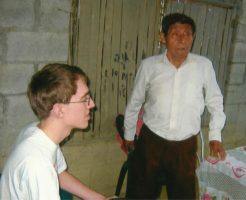 Some people have wishlists of things they hope to get for Christmas, or places they would like to go to on vacation. As a language nut, I understandably have a long list of languages that I would like to learn. There are so many interesting languages in the world, and so little time to learn them!
Some people have wishlists of things they hope to get for Christmas, or places they would like to go to on vacation. As a language nut, I understandably have a long list of languages that I would like to learn. There are so many interesting languages in the world, and so little time to learn them!
Looking at the languages I have tackled, however, the thing I’ve realized is that I only become proficient in a language when I have a community of people to speak it with. Take Spanish, for instance—for the past 9 years, I have spoken Spanish on a weekly basis with Spanish-speaking Christians, and thus I have gotten pretty good at speaking it. However, I still cannot speak Greek, even though I have been studying it even longer than Spanish. And why is that? Perhaps it’s because I don’t know anyone who speaks Greek, and it is a language I only use for reading and writing.
Recently I watched some interview videos on Chickasaw.tv about Joshua Hinson, the current director of the Chickasaw Language Department. He grew up in west Texas, and dabbled in some of the Chickasaw language early on, but he didn’t become proficient in the language until he reconnected with the Chickasaw community in Oklahoma and began actively seeking out native speakers to talk with.
Now, your motivations for learning a language may be different than mine. Perhaps you just want to be able to read and write in your target language, and there’s nothing wrong with that. But remember that language is essentially a means of communication. If you learn a language on your own, with no one to talk to, that defeats the purpose!
Besides Greek and Latin, the other languages I have set out to learn have been motivated by community. I learned Esperanto because I wanted to be a part of that international community. I tried my hand at French, so that I could speak with people and make myself understood in Belgium. I began learning Nahuatl so that I could connect with the native people in Mexico on a deeper level. And, most recently, I embarked on a journey to learn Korean, so that I could communicate with Koreans in my community and learn about them and their culture.
Language and culture are intricately woven together, and if you try to learn one without the other, I daresay your chances of becoming proficient that language are quite low. Interacting with a community of speakers gives language learning a human side, which encourages you and lets you see that this language is not just a bunch of dry rules from a textbook, but a living, breathing entity that allows you to see through the eyes of another people.
I imagine everybody would like to learn a language, but there are few who actually make the commitment to do it. I like what Joshua Hinson said in one of the videos:
“You have to be a little crazy to pick up any language. You gotta be always thinking about ‘What can I do? How can I expand my knowledge? Am I talking to myself in the car? Am I making up new words? Am I emailing in Chickasaw?’ You gotta go a little extra to become proficient. It’s tough.”
I think this is what sets serious language learners apart from those who never seem to make any progress. If you are really crazy about learning this language, you will be continuously working on it, and seeking out opportunities to practice speaking it.
Of course not all languages have this community. Several native languages of Oklahoma are already extinct, and more are on their way. However, this does not mean that they cannot be successfully revived. If you want to learn one of these languages, go for it, by all means! But in this case, you will have to create community. Find at least one other person who is as passionate as you are about learning this language, and learn and practice speaking together. It could be the beginning of a new life for a language that had gone silent.
Check out the aforementioned videos on Chickasaw.tv: How to Become Proficient in Chickasaw